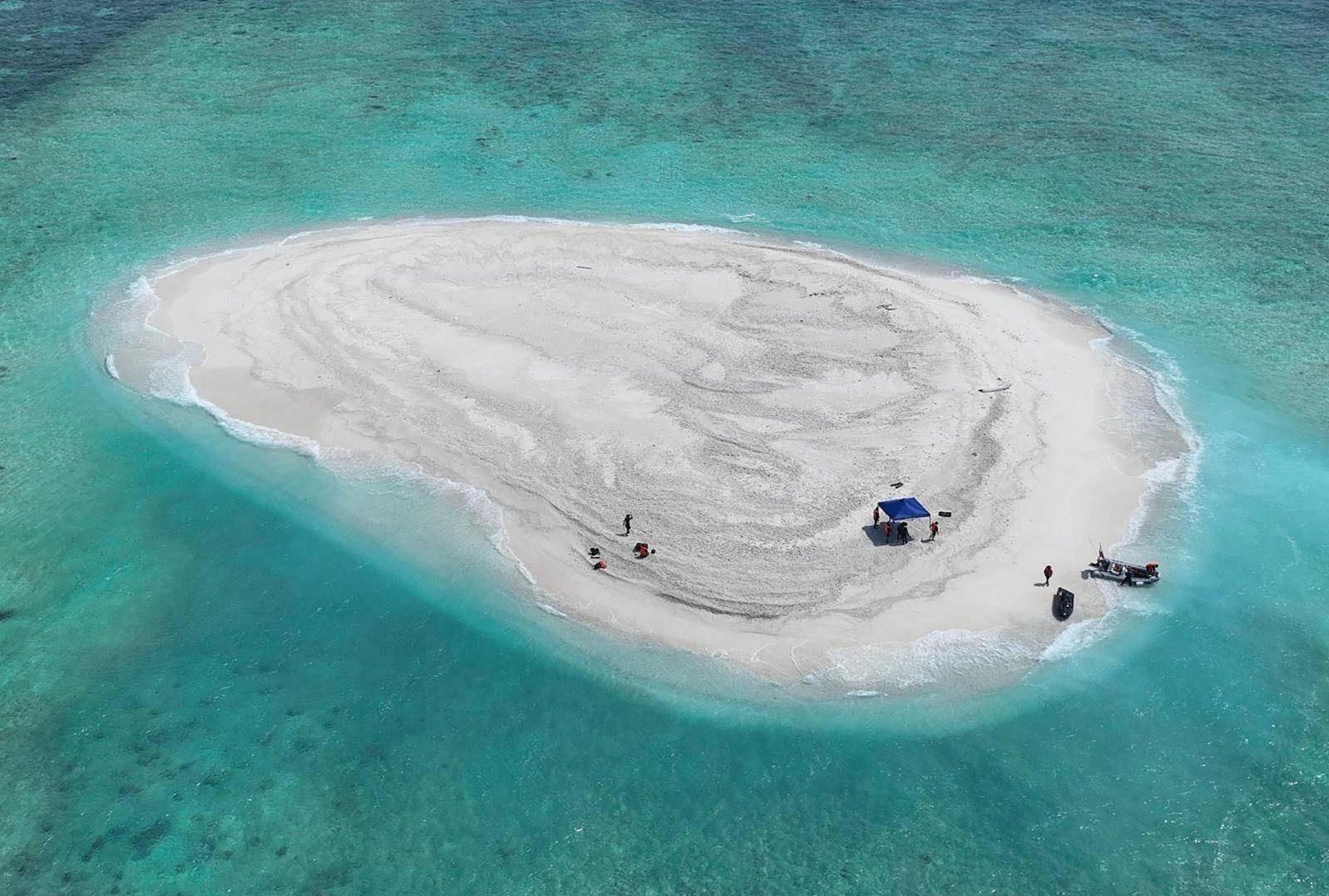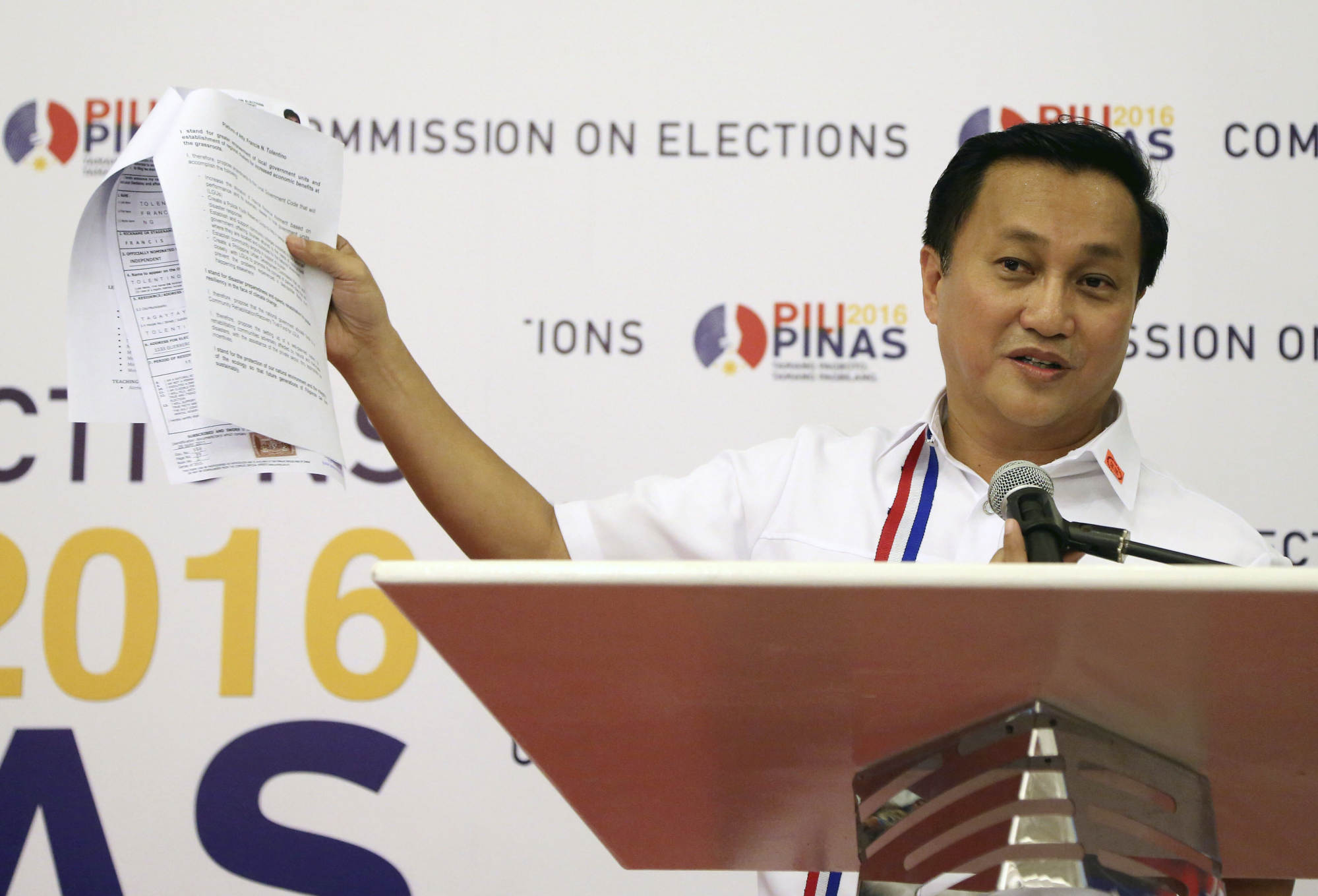China’s ban on ex-senator won’t halt Manila’s South China Sea stance: experts
Beijing’s travel ban on Francis Tolentino, imposed after his term, is seen as symbolic and won’t deter Filipino lawmakers from asserting sovereignty in the South China Sea

China’s decision to bar former Philippine senator Francis Tolentino from entering its territories is unlikely to deter lawmakers in Manila from pursuing legislation that Beijing might oppose, according to analysts and current legislators.
The indefinite travel ban on Tolentino, a former Senate majority leader who lost his re-election bid in May, was announced by China’s foreign ministry on Tuesday, a day after his term formally ended. The ministry accused Tolentino of “egregious conduct on China-related issues”.
“For quite some time, driven by selfish interests, a handful of anti-China politicians in the Philippines have made malicious remarks and moves on issues related to China that are detrimental to China’s interests and China-Philippines relations,” ministry spokeswoman Mao Ning said in a brief statement.
In response, Tolentino released a statement calling the sanction “a badge of honour” and “a testament to my unwavering commitment to protect our national interest and our people’s dignity.”
“No foreign power can silence me or weaken my resolve to uphold our sovereignty,” he added.
The Chinese embassy in Manila had earlier accused Tolentino of playing “the so-called China card to serve their political self-interests and boost their election prospects before the midterm elections. Such attempts are despicable and doomed to failure”.
Observers noted that Beijing waited until Tolentino was out of office before taking action.
“It appears that China is intentionally avoiding the imposition of sanctions on sitting Philippine officials to avoid diplomatic backlash,” Lucio Blanco Pitlo, president of the Philippine Association for Chinese Studies, told This Week in Asia.
He called China’s action “more symbolic, confined to travel curbs to the Mainland, Hong Kong, and Macau”, adding that those affected can opt for alternative transit points, causing minimal disruption to their international travel plans.
But, he pointed out, Beijing waited for the midterm election results before acting, as the former Senate Majority Leader lost his re-election bid.
He said Tolentino could have elicited Beijing’s displeasure because “he sponsored landmark maritime bills that passed into law – the Philippine Maritime Zones Act and the Archipelagic Sea Lanes Act.”

The acts defined the country’s four maritime zones for the first time, including the West Philippine Sea, Manila’s name for a portion of the South China Sea, which encompasses a 200 nautical mile exclusive economic zone (EEZ) and the Kalayaan Island Group in the Spratly Islands.
The sea lanes act restricts foreign vessels and planes to follow specified routes while transiting within the country’s internal waters.
“However,” Pitlo stressed, “it is his bold accusations of Chinese espionage and interference in the polls, claims China refuted, that likely drew Beijing’s ire.” Tolentino claimed that Chinese spies were “embedded” inside the Philippine government.
Tolentino also accused the Chinese embassy of hiring local public relations firm Infinitus Marketing Solutions to create fake social media accounts that trolled him, criticised the Typhon missile system installed by the US, attacked the maritime zones’ law, and smeared President Ferdinand Marcos Jnr.
Infinitus denied his accusations, and the embassy called his attempts “despicable and doomed to failure.”
Tolentino responded by issuing a statement saying, “I look forward to seeing the day when we will be expelling some Chinese diplomats because of this incident.”

Pitlo said it was not the first time that Beijing had imposed travel restrictions against high-ranking Filipino leaders.
In May 2019, Conchita Carpio-Morales, a retired Supreme Court justice and top anti-corruption prosecutor, was barred from entering Hong Kong for a family holiday and held for about four hours, Pitlo said.
“Hong Kong airport and immigration officials later told her there was a mistake and that she could proceed with her trip to Hong Kong, but she and her family had already decided to return home,” he recalled.
The following month, former Department of Foreign Affairs (DFA) secretary Albert del Rosario flew to Hong Kong to attend a business meeting and was also barred entry.
Pitlo indicated that the ban likely resulted from a complaint by Carpio-Morales and Del Rosario to the International Criminal Court in March that year against Chinese President Xi Jinping and other Chinese officials, citing damage to coral reefs and artificial islands affecting Filipino fishermen in the South China Sea.
“It was also under the watch of Secretary del Rosario that Manila took Beijing to international arbitration in 2013, following months of a tense stand-off over the Scarborough Shoal in 2012,” he said.
The stressful experience in Hong Kong affected Antonio Carpio, a retired Philippine Supreme Court justice advocating for Manila’s maritime rights. “I have not been to Hong Kong since the time Secretary Albert del Rosario and Justice Morales were barred from entering Hong Kong. I expect they will do the same to me,” he told This Week in Asia.
“China always intimidates those who resist its hegemonic actions. China thinks it will scare others from resisting,” Carpio said.
Effects on Philippine Senate
Carpio also recommended that the Senate affirm that the Philippines, as a sovereign state, can legislate to protect its exclusive economic zone and extended continental shelf under the United Nations Convention on the Law of the Sea (UNCLOS).
“In solidarity with a former colleague, the Senate can express its dismay over this Chinese move,” Pitlo said.
Beijing’s actions were unlikely to stop the upper chamber from investigating Chinese activities that threaten Philippine interests, as the maritime dispute is crucial for the country and lawmakers want to be seen as defending the national stance in the contentious area, he added.
Newly re-elected Senator Francis Pangilinan told This Week in Asia he would “support a Senate resolution condemning the said sanctions. The Philippines does not recognise the false and illegal claims of China over our ocean waters and our UNCLOS recognised EEZ.”
He expressed doubt that current senate members would be discouraged by Beijing’s actions against a former Senate official, but said that it will only strengthen the Philippines’ resolve to defend its national interests against Chinese claims in the disputed waters.
“The DFA should file a diplomatic protest on such a ban and make it known to the Chinese government,” Pangilinan said.
Acting Senate President Jinggoy Estrada also urged the DFA to summon the Chinese envoy to explain why its government considers sponsoring two landmark pieces of legislation that assert Manila’s maritime rights as “egregious acts” by Tolentino.
“Will they now impose the same sanctions on our President for signing” the two laws?,” Estrada asked.
The Senate resumes on July 28. Among the measures expected to be refiled is a law to amend the country’s espionage act to include spying during peacetime as a criminal offence. The current law specifies that spying can only be considered a crime when the country is at war with a foreign power.